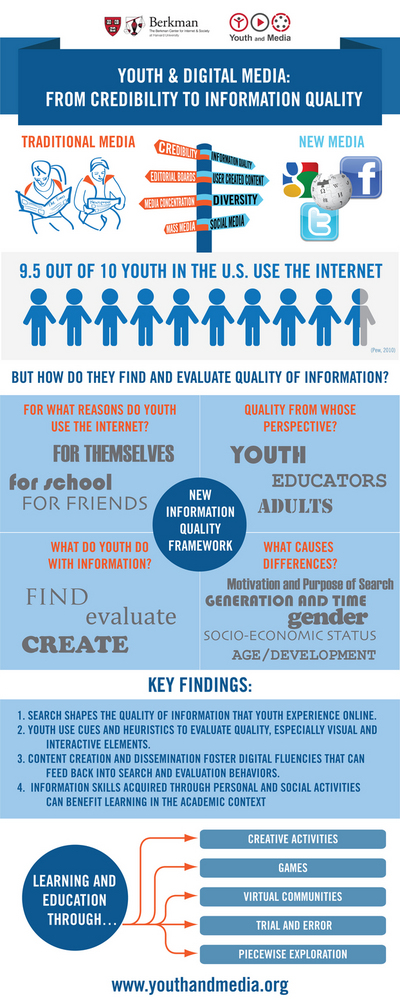New report explores the ways in which young people currently search for, evaluate, create, and share information.
 The Youth and Media project at Harvard University’s Berkman Center for Internet & Society just released a report entitled Youth and Digital Media: From Credibility to Information Quality. The report “seeks to map and explore what we know about the ways in which young users search for information online, how they evaluate information, and how their related practices of content creation, levels of new literacies, general digital media usage, and social patterns affect these activities.” Here are their key findings:
The Youth and Media project at Harvard University’s Berkman Center for Internet & Society just released a report entitled Youth and Digital Media: From Credibility to Information Quality. The report “seeks to map and explore what we know about the ways in which young users search for information online, how they evaluate information, and how their related practices of content creation, levels of new literacies, general digital media usage, and social patterns affect these activities.” Here are their key findings:
- Youths’ information seeking and information evaluation processes are not clearly distinct. On the contrary, youth evaluate the usefulness of information throughout their search. Therefore, depending on context, information that is available, accessible, and inviting may be of higher quality to an information seeker than a more exhaustive and credible source that is less accessible.
- Although youth may at times use different evaluative strategies than adults, such as visual cues and heuristics, they are nonetheless dealing with a similar set of issues concerning the quality of information online as the adult population.
- Content creation and dissemination activities foster various digital fluencies that can feed back into search and evaluation behaviors. Creation and sharing in collaborative online environments also foster norms that relate to skill development.
- Although content creation occurs mainly through personal and social activities, such as social networking services, wikis, personal websites, blogs, self-authored content sharing, games, etc., the learning that occurs may provide interfaces for learning in the academic context.
The report provides some encouraging insights into how our students are currently using and evaluating information, and how the practice of creating and sharing information can actually help improve evaluative skills. Here is the nifty infographic version of the report:
(Thanks to NeverEndingSearch for sharing this report.)





